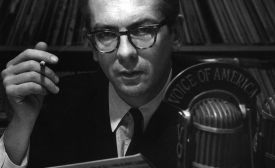voa
Recently, there has been a great deal of debate, and no small amount of axe grinding, regarding the mission and the effectiveness of U.S. international broadcasting under the Broadcasting Board of Governors.

VOA veteran Joseph Bruns outlines ways to keep the int'l broadcasting giant relevant.
At the height of the Cold War, the BBC World Service, Radio Canada International and the Voice of America used high-power, multilingual broadcasts on the shortwave radio bands (1710 kHz–30 MHz) to blast news and information behind the Soviet Union’s “Iron Curtain.” In turn, Radio Moscow, Radio Havana Cuba and East Germany’s Radio Berlin International pumped their own versions of reality to the world via shortwave.

Reprinted from the CPD Blog by Emily Metzgar

If signed into law, HR4490 will end the Voice of America as the world has known it for over seven decades.
Government-sponsored international broadcasting is an increasingly high-profile topic, not least because it crosses both metaphorical and physical boundaries between journalism and foreign policy.

Emily Metzgar considers whether U.S. international broadcasting can serve policy needs while keeping its journalistic integrity.
This week, a stirring new documentary from the Voice of America called “AIDS: Living in the Shadows” made its world premiere at the 20th International AIDS Conference in Melbourne, Australia. The documentary takes audiences on a journey to Nigeria, Cambodia, Haiti, Uganda, Canada, and the United States to meet those living with HIV and AIDS. This is the most recent example of the excellent work done by VOA as it serves its audiences around the world while promoting the interests of the United States — in this case, helping halt a global pandemic.







